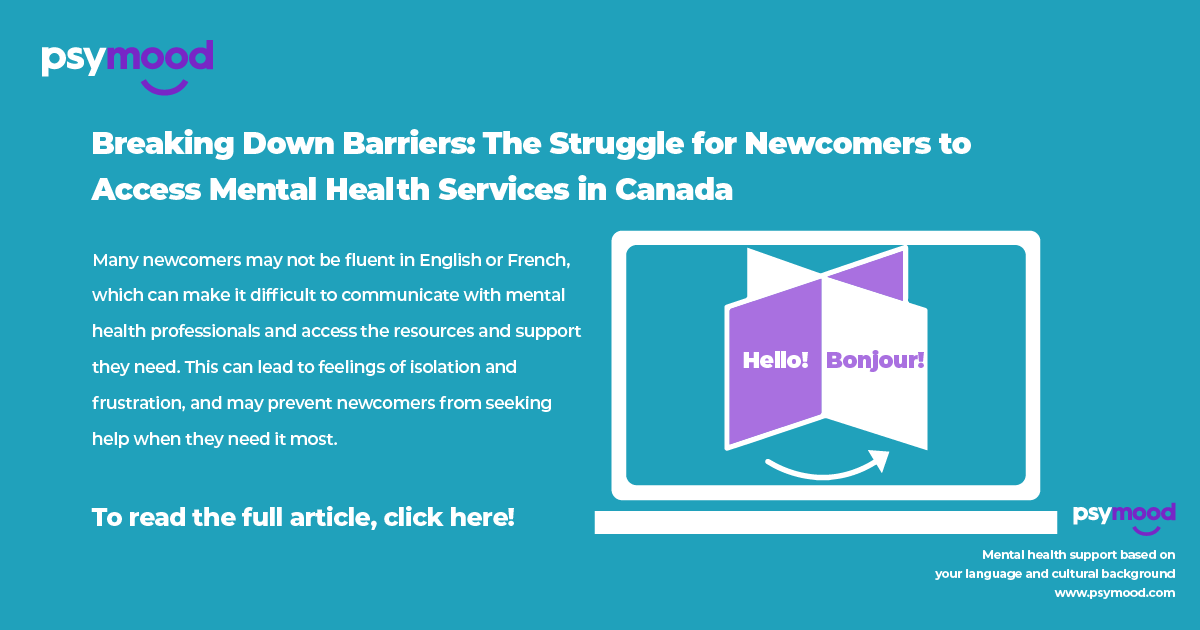Breaking Down Barriers: The Struggle for Newcomers to Access Mental Health Services in Canada
As a diverse and multicultural country, Canada has long welcomed newcomers from all around the world. While moving to a new country can be an exciting adventure, it can also be challenging and overwhelming, particularly when it comes to accessing mental health care.
One of the biggest barriers to accessing mental health care for newcomers is language. Many newcomers may not be fluent in English or French, which can make it difficult to communicate with mental health professionals and access the resources and support they need. This can lead to feelings of isolation and frustration, and may prevent newcomers from seeking help when they need it most.
Some additional ways newcomers struggle with accessing mental health are:
- Lack of knowledge about the healthcare system: The healthcare system in Canada can be complex and confusing, particularly for those who are new to the country and unfamiliar with the system. Newcomers may not know where to go for mental health services or how to navigate the system to access care.
- Cultural differences and stigmas around mental illness: Newcomers may come from cultures where mental illness is stigmatized or not well understood, which can make it difficult to talk openly about mental health concerns or seek treatment. Different beliefs about the causes of mental illness or preferred treatments may also impact access to mental health care.
- Limited access to resources and support: Newcomers may not know about the mental health resources and support available to them, or may face financial or logistical barriers to accessing these resources.
- Immigration status: Some newcomers may face additional barriers to accessing mental health care due to their immigration status, such as limited access to health insurance or fear of deportation.
Unique Issues Newcomers Face
Newcomers to Canada may face unique mental health issues related to their migration experience and settlement in a new country. Here are some examples of mental health issues that newcomers may face:
Culture shock: Culture shock is a common experience for newcomers, as they adjust to a new culture, language, and way of life. This can lead to feelings of disorientation, loneliness, and isolation.
Trauma: Some newcomers may have experienced trauma in their home country, such as war, violence, or persecution. This can lead to symptoms of post-traumatic stress disorder (PTSD) or other mental health conditions.
Separation from family and support networks: Many newcomers leave behind family and support networks when they migrate to Canada, which can lead to feelings of loneliness and isolation.
Employment and financial stress: Newcomers may experience stress related to finding employment and supporting themselves financially in a new country, which can impact their mental health.
Discrimination and racism: Newcomers may face discrimination and racism, which can lead to feelings of distress, anxiety, and depression.
Language barriers: Newcomers may struggle with language barriers, which can impact their ability to communicate with others and access mental health services.
Providing Adequate Mental Health Services to Newcomers
One solution is to increase the availability of culturally and linguistically appropriate mental health services. This could include hiring mental health professionals who speak multiple languages, providing training and resources to healthcare providers to help them better understand and address the needs of newcomers, and creating community-based mental health programs that are tailored to the unique needs of different cultural groups.
Another solution is to improve outreach and education efforts to ensure that newcomers are aware of the mental health resources and supports that are available to them. This could include providing information in multiple languages, partnering with community organizations and cultural groups to raise awareness about mental health, and using social media and other digital platforms to reach out to newcomers and connect them with resources and support.
We can also work to increase awareness of mental health resources. Community organizations, settlement agencies, and other groups that work with newcomers can play a key role in raising awareness of mental health resources and support services available in Canada.
We also need to ensure that the care we create for newcomers is culturally sensitive, this means that mental health providers should be trained to provide culturally sensitive care that takes into account the unique cultural backgrounds and beliefs of their clients. This includes understanding cultural beliefs around mental illness and preferred treatment approaches.
It is also important to remember that sometimes newcomers may have stigma around mental health care. Efforts should be made to address stigma and misinformation around mental illness in newcomer communities.
And finally, we should be able to provide accessible and affordable services to our newcomers. Mental health services should be affordable and accessible to all newcomers, regardless of their financial situation or immigration status. This can involve offering free or low-cost services, as well as ensuring that mental health services are covered under provincial health insurance plans.
PsyMood is a digital tool designed to help you find the support you need in the language that you are most comfortable with. PsyMood considers cultural background, geographical location, interests, and personal needs, amongst other factors, to pair you with service providers for either online or in-person therapy sessions.


.png)
.png)
.png)
Recent Comments